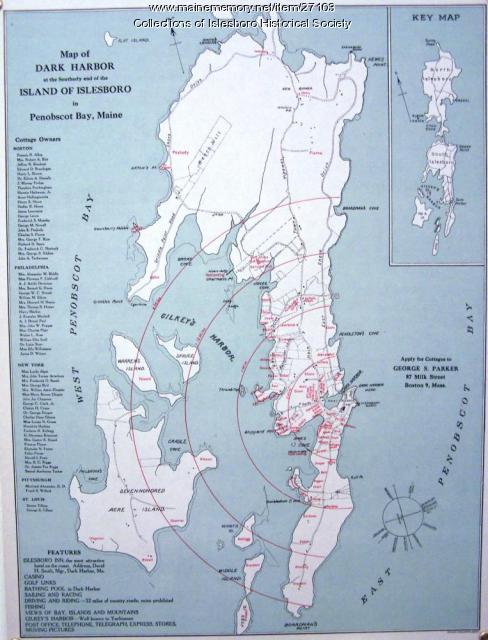Keywords: Landings
Item 108625
Hinkley Landing, West Georgetown, ca. 1915
Contributed by: Penobscot Marine Museum Date: circa 1915 Location: Georgetown Media: Glass Plate Negative
Item 27103
Dark Harbor Cottages Poster, Islesboro, ca. 1900
Contributed by: Islesboro Historical Society Date: circa 1900 Location: Islesboro Media: Ink on paper
Item 50033
Assessor's Record, Land only, Dudley Street, Portland, 1924
Owner in 1924: A.H. Chapman Land Co. Use: Land only
Item 32421
37-47 Ashmont Street, Portland, 1924
Owner in 1924: Charlie E Clark Style: Land Use: Hot House
Item 150742
House for Mountain Park Land Co., Lewiston, 1895
Contributed by: Maine Historical Society Date: 1895 Location: Lewiston Client: Mountain Park Land Company Architect: George M. Coombs
Item 150865
Silver Lake section of Summer Haven, Augusta, 1927
Contributed by: Maine Historical Society Date: 1927 Location: Augusta Client: Recreation Land Co. Architect: E. F. Pooler
Exhibit
Land Claims, Economic Opportunities?
The landmark 1980 Maine Indian Land Claims Settlement Act provided $81.6 million to Maine Indians for economic development, land purchase and other purposes. The money and increased land holdings, however, have not solved economic and employment issues for Maine Indians.
Exhibit
Settling along the Androscoggin and Kennebec
The Proprietors of the Township of Brunswick was a land company formed in 1714 and it set out to settle lands along the Androscoggin and Kennebec Rivers in Maine.
Site Page
"Fixing Borders on the Land: The Northeastern Boundary in Treaties and Local Reality, 1763-1842 St."
Site Page
"Fixing Borders on the Land: The Northeastern Boundary in Treaties and Local Reality, 1763-1842 Essay by Liam Riordan Riordan is American historian…"
Story
A New Beginning for Wabanaki Land Relationships
by John Banks
Wabanaki leadership in land stewardship
Story
The Journey Home
by Gina Brooks
I am a Maliseet artist from the St. Mary’s First Nation, my work is about our connection to the land
Lesson Plan
Immigration: U.S. Immigrants and the Land of Opportunity
Grade Level: 9-12
Content Area: Social Studies
Learn about immigration in the United States using primary sources from Maine Memory Network and the Library of Congress.
Lesson Plan
Wabanaki Studies: Stewarding Natural Resources
Grade Level: 3-5
Content Area: Science & Engineering, Social Studies
This lesson plan will introduce elementary-grade students to the concepts and importance of Traditional Ecological Knowledge (TEK) and Indigenous Knowledge (IK), taught and understood through oral history to generations of Wabanaki people. Students will engage in discussions about how humans can be stewards of the local ecosystem, and how non-Native Maine citizens can listen to, learn from, and amplify the voices of Wabanaki neighbors to assist in the future of a sustainable environment. Students will learn about Wabanaki artists, teachers, and leaders from the past and present to help contextualize the concepts and ideas in this lesson, and learn about how Wabanaki youth are carrying tradition forward into the future.





















